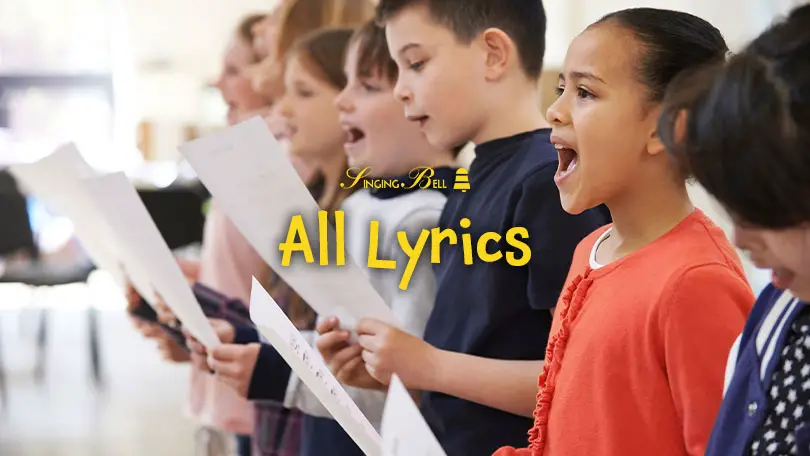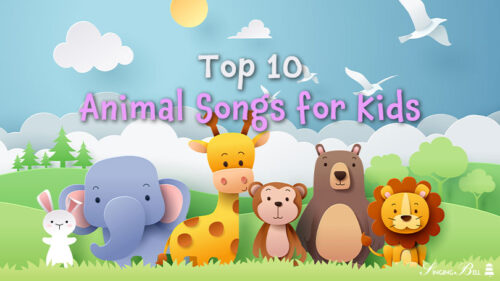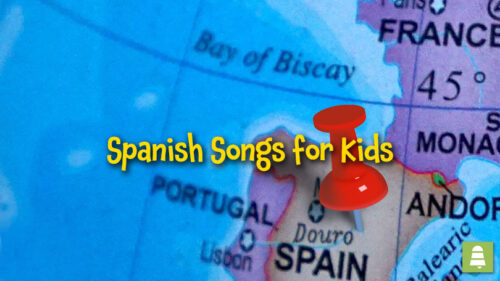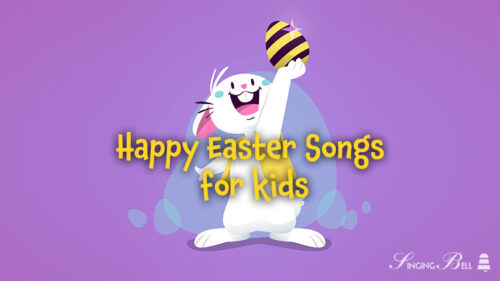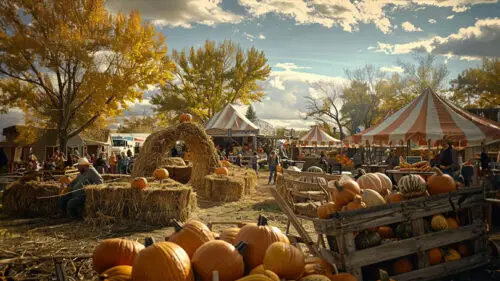
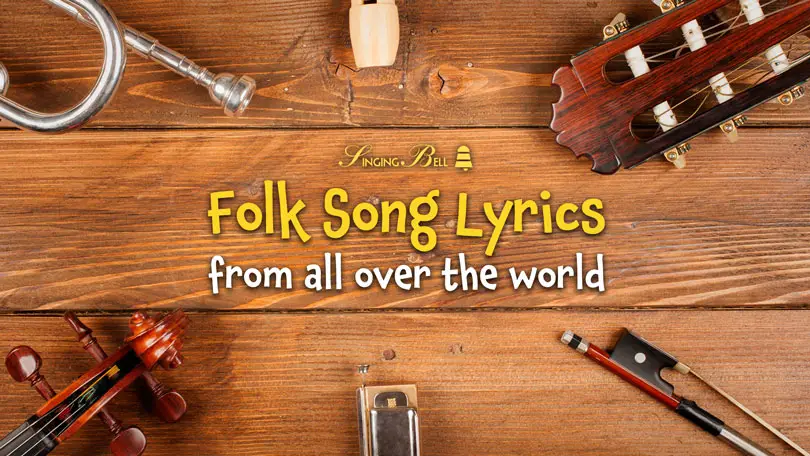
It’s amazing to realize how much knowledge is passed on from generation to generation through folk song lyrics. No matter what their language or origin is, traditional songs influence people and, of course, they help record big parts of our history.
Although these lyrics are usually memorable and their melodies are so popular, we often need a helping hand when it comes to singing them. We have gone through the endless catalogue of folk music in order to spotlight the words for 36 well-loved folk songs.These songs all come with their traditional lyrics and a link with a free printable PDF for each.
Table of Contents
Folk Song Lyrics by Country
Irish Folk Song Lyrics

Ireland is a country with rich music history and several of these Irish folk songs crossed the pond by those who left Ireland as emigrants and arrived in the US initially as settlers or as workers later.
Danny Boy
Due to the deep emotions reflected in it, Danny Boy is loved by millions of people across the world. The song’s appreciation is covering a large span; you can hear it as a family song or a lullaby sung from mother to child, to a funeral or memorial service farewell tune.
The song has been recorded by many artists like Daniel O’Donnell, Bing Crosby, Eva Cassidy, Judith Durham and Declan Galbraith – just to name a few.
1. Oh, Danny boy, the pipes, the pipes are calling
From glen to glen, and down the mountain side.
The summer’s gone, and all the roses falling,
It’s you, it’s you must go and I must bide.2. But come ye back when summer’s in the meadow,
Or when the valley’s hushed and white with snow,
It’s I’ll be here in sunshine or in shadow,
Oh, Danny boy, oh Danny boy, I love you so!3. But when ye come, and all the flowers are dying,
If I am dead, as dead I well may be,
You’ll come and find the place where I am lying,
And kneel and say an Ave there for me.4. And I shall hear, though soft you tread above me,
And all my grave will warmer, sweeter be,
For you will bend and tell me that you love me,
And I shall sleep in peace until you come to me!
Click here for video and printable lyrics in PDF
Molly Malone (Cockles and Mussels)
Also called “In Dublin’s fair city” due to its first lyric, “Molly Malone (Cockles & Mussels)” is a sort of unofficial anthem of Dublin city, Ireland. Molly Malone was a legendary fishmonger. It isn’t clear if she was a real person, but is referred to as a nice woman who died young from a fever.
In memory of her, a statue has been placed on Suffolk Street since 1987, the city’s first millennium celebration.
1. In Dublin’s fair city
Where the girls are so pretty
I first set my eyes on sweet Molly Malone
As she wheeled her wheel-barrow
Through streets broad and narrow
Crying, “Cockles and mussels, alive, alive, oh!”
“Alive, alive, oh,
Alive, alive, oh,”
Crying “Cockles and mussels, alive, alive, oh”.2. She was a fishmonger
But sure ’twas no wonder
For so were her father and mother before
And they wheeled their barrows
Through the streets broad and narrow
Crying, “Cockles and mussels, alive, alive, oh!”
“Alive, alive, oh,
Alive, alive, oh,”
Crying “Cockles and mussels, alive, alive, oh”.3. She died of a fever
And no one could save her
And that was the end of sweet Molly Malone.
But her ghost wheels her barrow
Through streets broad and narrow
Crying, “Cockles and mussels, alive, alive, oh!”
“Alive, alive, oh,
Alive, alive, oh,”
Crying “Cockles and mussels, alive, alive, oh”.
Click here for video and printable lyrics in PDF
An Irish Lullaby (Too-ra-loo-ra-loo-ral)
“Too-Ra-Loo-Ra-Loo-Ral (An Irish Lullaby or That’s an Irish Lullaby)” is an Irish-American lullaby originally written in 1913 by lyricist, actor, and composer James Royce Shannon (1881–1946), for the Tin Pan Alley musical Shameen Dhu. The original recording of the song, by Chauncey Olcott, peaked at #1 on the music charts.
Many years later, in 1944-5, Bing Crosby brought it to public attention again by performing it in the film Going My Way. Crosby’s single sold over a million copies. The song has been performed by many artists: Jerry Lewis and Dean Martin, Kate Smith, and Van Morrison.
1. Over in Killarney, many years ago
My Mother sang a song to me
in tones so sweet and low,
Just a simple little ditty,
in her good ould Irish way,
And I’d give the world
if she could sing
That song to me this day.Too-ra-loo-ra-loo-ral,
Too-ra-loo-ra-li,
Too-ra-loo-ra-loo-ral,
Hush now don’t you cry!
Too-ra-loo-ra-loo-ral,
Too-ra-loo-ra-li,
Too-ra-loo-ra-loo-ral,
That’s an Irish lullaby.2. Oft in dreams I wander
To that cot again,
I feel her arms a-huggin’ me
As when she held me then.
And I hear her voice a-hummin’
To me as in days of yore,
When she used to rock me fast asleep
Outside the cabin door.Too-ra-loo-ra-loo-ral,
Too-ra-loo-ra-li,
Too-ra-loo-ra-loo-ral,
Hush now don’t you cry!
Too-ra-loo-ra-loo-ral,
Too-ra-loo-ra-li,
Too-ra-loo-ra-loo-ral,
That’s an Irish lullaby.
Click here for video and printable lyrics in PDF
I’ll Tell Me Ma (The Belle of Belfast City)
“I’ll Tell Me Ma” is a well-known Irish children’s song. The song is also known as The Belle of Belfast City, The Wind and The Boys Won’t Leave the Girls Alone.
Most Irish cities have versions of the song and the lyrics are often changed to suit. Dublin performers are perhaps the most assertive in this respect, singing about the Belle of Dublin City.
I’ll tell me ma when I go home,
the boys wont leave the girls alone,
They pull me hair and stole me comb,
but that’s all right till I go home,
She is handsome, she is pretty,
she is the girl from Belfast City,
She is courting one two three,
please wont you tell me who is she?Albert Mooney says he loves her,
all the boys are fighting for her.
They knock on her door they ring on her bell
saying “oh me true love are you well?”
Out she comes as white as snow,
rings on her fingers bells on her toes,
Old Jenny Murphy says she’ll die,
if she doesn’t get the fellow with the roving eye.Let the wind and the rain and the hail blow high,
and the snow come shovelling from the sky,
She’s as sweet as apple pie,
and she’ll get her own lad by and by.
When she gets a lad of her own,
she won’t tell her ma when she gets home,
Let them all come as they will,
but its Albert Mooney she loves still.
Click here for video and printable lyrics in PDF
English Folk Song Lyrics

Folk songs from England have travelled around the world, sometimes through immigration or because of the British colonies. Their dates of origin vary from Medieval to the 19th century.
Greensleeves
“Greensleeves” is a traditional English folk song and tune, over a ground either of the form called a romanesca; or its slight variant, the passamezzo antico; or the passamezzo antico in its verses and the romanesca in its reprise; or of the Andalusian progression in its verses and the romanesca or passamezzo antico in its reprise.
There is a persistent belief that Greensleeves was composed by Henry VIII for his lover and future queen consort Anne Boleyn. Boleyn allegedly rejected King Henry’s attempts to seduce her, and this rejection may be referred to in the song when the writer’s love “cast me off discourteously”. However, the piece is based on an Italian style of composition that did not reach England until after Henry’s death, making it more likely to be Elizabethan in origin.
Alas, my love, you do me wrong,
To cast me off discourteously.
For I have loved you well and long,
Delighting in your company.
Greensleeves was all my joy
Greensleeves was my delight,
Greensleeves was my heart of gold,
And who but my lady Greensleeves.I have been ready at your hand,
To grant whatever thou wouldst crave;
I have both wagered life and land,
Your love and good-will for to have.
Greensleeves was all my joy
Greensleeves was my delight,
Greensleeves was my heart of gold,
And who but my lady Greensleeves.I bought thee petticoats of the best,
The cloth so fine as it might be;
I gave thee jewels for thy chest,
And all this cost I spent on thee.
Greensleeves was all my joy
Greensleeves was my delight,
Greensleeves was my heart of gold,
And who but my lady Greensleeves.Thy smock of silk, both fair and white,
With gold embroidered gorgeously;
Thy petticoat of sendal right,
And these I bought thee gladly.
Greensleeves was all my joy
Greensleeves was my delight,
Greensleeves was my heart of gold,
And who but my lady Greensleeves.Well I pray to God on high,
That thou my constancy mayst see,
And that yet once before I die,
Thou wilt vouchsafe to love me.
Greensleeves was all my joy
Greensleeves was my delight,
Greensleeves was my heart of gold,
And who but my lady Greensleeves.Greensleeves, now farewell, adieu,
God I pray to prosper thee,
For I am still thy lover true,
Come once again and love me.
Greensleeves was all my joy
Greensleeves was my delight,
Greensleeves was my heart of gold,
And who but my lady Greensleeves.
Click here for video and printable lyrics in PDF
Scarborough Fair
“Scarborough Fair” is a traditional English ballad of the 17th century. It is a song about love that lists a number of impossible tasks given to a former lover who lives in Scarborough.
The song gained much popularity in the 60’s by the folk rock duet Simon & Garfunkel.
Are you going to Scarborough Fair?
Parsley, sage, rosemary and thyme
Remember me to one who lives there
For once he was a true love of mine.Tell him to make me a cambric shirt
Parsley, sage, rosemary and thyme
Without no seams nor needle work
And he shall be the true love of mine.Tell him to wash it in yonder dry
Parsley, sage, rosemary and thyme
Where water sprungand rain never fell
And he shall be the true love of mine.Tell him to buy me an acre of land
Parsley, sage, rosemary and thyme
Between salt water and the sea sand
And then he’ll be the true love of mine.Tell him to reap it with a sickle of leather
Parsley, sage, rosemary and thyme
And gather it all in a bunch of heather
And then he’ll be the true love of mine.Are you going to Scarborough Fair?
Parsley, sage, rosemary and thyme
Remember me to the one who lives there
For once he was a true love of mine.
Click here for video and printable lyrics in PDF
The More We Get Together
“The More We Get Together” is a traditional British folk song and popular children’s song dating to the 18th or 19th century.
Like “Did You Ever See a Lassie?”, its tune was taken from a 1679 Viennese tune by Marx Augustin, “Oh du lieber Augustin”. The rhyme has been used in various ads, jingles and trailers.
The more we get together,
together, together,
the more we get together,
the happier we’ll be.Cause your friends
are my friends,
and my friends
are your friends.The more we get together,
the happier we’ll be.
Click here for video and printable lyrics in PDF
Lavender’s Blue (Dilly Dilly)
“Lavender’s Blue” is an English folk song and nursery rhyme from the 17th century.
It became very popular during the 20th century through various versions (classical, pop, film/TV, etc.) with the most recent one being Disney’s 2015 live-action film Cinderella, directed by Kenneth Branagh.
1. Lavender’s blue, dilly, dilly, lavender’s green
When I am king, dilly, dilly, You shall be queen
Who told you so, dilly, dilly, who told you so?
‘Twas my own heart, dilly, dilly, that told me so2. Call up your men, dilly, dilly, set them to work
Some to the plough, dilly, dilly, some to the fork
Some to make hay, dilly, dilly, some to cut corn
While you and I, dilly, dilly, keep ourselves warm3. Lavender’s green, dilly, dilly, Lavender’s blue
if you love me, dilly, dilly, I will love you.
Let the birds sing, dilly, dilly, and the lambs play
We shall be safe, dilly, dilly, out of harm’s way4. I love to dance, dilly, dilly, I love to sing
When I am queen, dilly, dilly, You’ll be my king
Who told me so, dilly, dilly, Who told me so?
I told myself, dilly, dilly, I told me so
Click here for video and printable lyrics in PDF
A Frog He Would A-Wooing Go
Also known as “Froggy Would A-Wooing Go” is a popular English folk song from the 17th century.
Among the song’s many variations is “Froggy Went A Courtin’,” a folk song that tells a similar story of a frog’s romantic pursuit of a mouse, but has a completely different melody and lyrics.
1. A frog he would a-wooing go,
Heigh ho! says Rowley,
A frog he would a-wooing go,
Whether his mother would let him or no.
With a rowley, powley*, gammon, and spinach,
Heigh ho! says Anthony Rowley.2. So off he set with his opera hat,
Heigh ho! says Rowley,
So off he set with his opera hat,
And on the road he met with a rat,
With a rowley, powley, gammon, and spinach,
Heigh ho! says Anthony Rowley.3. Pray, Mr. Rat will you go with me?
Heigh ho! says Rowley,
Pray, Mr. Rat will you go with me,
Kind Mrs. Mousey for to see…
With a rowley, powley, gammon, and spinach,
Heigh ho! says Anthony Rowley.4. They came to the door of Mousey’s hall,
Heigh ho! says Rowley,
They gave a loud knock, and they gave a loud call.
With a rowley, powley, gammon, and spinach,
Heigh ho! says Anthony Rowley.5. Pray, Mrs. Mouse are you within?
Heigh ho! says Rowley,
Oh yes, kind sirs, I’m sitting to spin.
With a rowley, powley, gammon, and spinach,
Heigh ho! says Anthony Rowley.6. Pray, Mrs. Mouse will you give us some beer?
Heigh ho! says Rowley,
For Froggy and I are fond of good cheer.
With a rowley, powley, gammon, and spinach,
Heigh ho! says Anthony Rowley.7. Pray, Mr. Frog will you give us a song?
Heigh ho! says Rowley,
Let it be something that’s not very long.
With a rowley, powley, gammon, and spinach,
Heigh ho! says Anthony Rowley.8. Indeed, Mrs. Mouse, replied Mr. Frog,
Heigh ho! says Rowley,
A cold has made me as hoarse as a dog.
With a rowley, powley, gammon, and spinach,
Heigh ho! says Anthony Rowley.9. Since you have a cold, Mr. Frog, Mousey said,
Heigh ho! says Rowley,
I’ll sing you a song that I’ve just made.
With a rowley, powley, gammon, and spinach,
Heigh ho! says Anthony Rowley.10. But while they were all a-merry-making
Heigh ho! says Rowley,
A cat and her kittens came tumbling in.
With a rowley, powley, gammon, and spinach,
Heigh ho! says Anthony Rowley.11. The cat she seized the rat by the crown,
Heigh ho! says Rowley,
The kittens they pulled the little mouse down.
With a rowley, powley, gammon, and spinach,
Heigh ho! says Anthony Rowley.12. This put Mr. Frog in a terrible fright,
Heigh ho! says Rowley.
He took up his hat and he wished them goodnight.
With a rowley, powley, gammon, and spinach,
Heigh ho! says Anthony Rowley.13. But as Froggy was crossing over a brook,
Heigh ho! says Rowley.
A lily white duck came and gobbled him up.
With a rowley, powley, gammon, and spinach,
Heigh ho! says Anthony Rowley.14. So there was the end of one, two, three,
Heigh ho! says Rowley.
The rat, the mouse, and the little froggy.
With a rowley, powley, gammon, and spinach,
Heigh ho! says Anthony Rowley.
Click here for video and printable lyrics in PDF
For He’s a Jolly Good Fellow
“For He’s a Jolly Good Fellow” or “For She’s a Jolly Good Fellow”, depending on the person we sing it for, is a song to wish in case of birthday, marriage, birth, or just for good luck, health or to congratulate somebody. The tune is based on the 18th century French song “Marlbrough s’en va-t-en guerre” and the song “The bear went over the mountain” is in turn based on “For He’s a Jolly Good Fellow“.
The song is one of the most popular ones in English-language countries, and it has been translated into many other languages all over the world.
British version
For he’s a jolly good fellow, for he’s a jolly good fellow
For he’s a jolly good fellow, and so say all of us
And so say all of us, and so say all of us
For he’s a jolly good fellow, for he’s a jolly good fellow
For he’s a jolly good fellow, and so say all of us!
American version
For he’s a jolly good fellow, for he’s a jolly good fellow
For he’s a jolly good fellow, which nobody can deny
Which nobody can deny, which nobody can deny
For he’s a jolly good fellow, for he’s a jolly good fellow
For he’s a jolly good fellow, which nobody can deny!
Click here for video and printable lyrics in PDF
Scottish Folk Song Lyrics

Just like with Irish folk songs, traditional Scottish music has existed and been transforming from the late Middle Ages to contemporary Celtic Rock, that is playing traditional Scottish folk music with rock instrumentation.
Wild Mountain Thyme
“Wild Mountain Thyme” (also known as “Purple Heather” and “Will Ye Go, Lassie, Go?”) is a Scottish/Irish folk song.
The lyrics and melody are a variant of the song “The Braes of Balquhither” by Scottish poet Robert Tannahill (1774–1810) and Scottish composer Robert Archibald Smith (1780–1829), but were adapted by Belfast musician Francis McPeake (1885–1971) into “Wild Mountain Thyme” and first recorded by his family in the 1950s.
Oh, the summer time is coming,
And the trees are sweetly blooming,
And the wild mountain thyme
Grows around the blooming heather.
Will ye go, lassie go?
And we’ll all go together
To pluck wild mountain thyme
All around the blooming heather,
Will ye go, lassie, go?I will build my love a tower
Near yon pure crystal fountain,
And on it I will build,
All the flowers of the mountain.
Will ye go, lassie go?
And we’ll all go together
To pluck wild mountain thyme
All around the blooming heather,
Will ye go, lassie, go?If my true love, she were gone,
I will surely find another
Where wild mountain thyme
Grows around the blooming heather.
Will ye go, lassie go?
And we’ll all go together
To pluck wild mountain thyme
All around the blooming heather,
Will ye go, lassie, go?Oh, the summertime is coming
And the trees are sweetly blooming
And the wild mountain thyme
Grows around the blooming heather.
Will ye go, lassie go?
And we’ll all go together
To pluck wild mountain thyme
All around the blooming heather,
Will ye go, lassie, go?
My Bonnie Lies Over the Ocean
“My Bonnie Lies Over The Ocean” is a traditional Scottish folk song which remains popular in Western culture.
Although the song’s origin is uncertain, its subject may be Charles Edward Stuart (‘Bonnie Prince Charlie’): after the defeat of the Prince at the Battle of Culloden in 1746 and his subsequent exile, his Jacobite supporters could have sung the tune in his honour; and thanks to the ambiguity of the term “bonnie”, which can refer to a woman as well as to a man, they could pretend it was a love song.
1. My Bonnie lies over the ocean,
My Bonnie lies over the sea.
My Bonnie lies over the ocean,
Oh, bring back my Bonnie to me.Bring back, bring back,
Oh, bring back my Bonnie to me, to me.
Bring back, bring back
Oh, bring back my Bonnie to me.2. Last night as I lay on my pillow,
Last night as I lay on my bed.
Last night as I lay on my pillow,
I dreamt that my Bonnie was dead.Bring back, bring back,
Oh, bring back my Bonnie to me, to me.
Bring back, bring back
Oh, bring back my Bonnie to me.3. Oh blow the winds o’er the ocean,
And blow the winds o’er the sea.
Oh blow the winds o’er the ocean,
And bring back my Bonnie to me.Bring back, bring back,
Oh, bring back my Bonnie to me, to me.
Bring back, bring back
Oh, bring back my Bonnie to me.4. The winds have blown over the ocean,
The winds have blown over the sea.
The winds have blown over the ocean,
And brought back my Bonnie to me.Bring back, bring back,
Oh, bring back my Bonnie to me, to me.
Bring back, bring back
Oh, bring back my Bonnie to me.
Click here for video and printable lyrics in PDF
Did You Ever See a Lassie?
“Did you ever see a lassie?” is a nursery rhyme which, although first collected in the United States, seems to have Scottish origins, as the words “lassie” and “laddie” mean “girl” and “boy” in Scottish.
It is only in the mid-twentieth century that it began to be sung in Great Britain. The tune of the “Did you ever see a lassie?” is the same as the one of “The More We Get Together” and the German “Oh du lieber Augustin”.
1. Did you ever see a lassie,
A lassie, a lassie?
Did you ever see a lassie,
Go this way and that?
Go this way and that way,
Go this way and that way.
Did you ever see a lassie,
Go this way and that?2. Did you ever see a laddie,
A laddie, a laddie?
Did you ever see a laddie,
Go this way and that?
Go this way and that way,
Go this way and that way.
Did you ever see a laddie,
Go this way and that?
Click here for video and printable lyrics in PDF
Bluebells of Scotland
“The Bluebells of Scotland” is the usual modern name for a Scottish folk song, published in 1801 and written by Dora Jordan, an English actress and writer.
Oh where, and oh where is your Highland laddie gone?
Oh where, and oh where is your Highland laddie gone?
He’s gone to fight the French, for King George upon the throne.And it’s oh ! in my heart I wish him safe at home.
He’s gone to fight the French, for King George upon the throne;
And it’s oh! in my heart, I wish him safe at home.Oh where, and oh where did your Highland laddie dwell?
He dwelt in merry Scotland, at the sign of the Blue Bell;
And it’s oh! in my heart I love my laddie wellIn what clothes, in what clothes, is your Highland laddie clad?
His bonnet’s of the Saxon green, and his waistcoat of a plaid;
And it’s oh! in my heart I love my Highland lad.Suppose, and suppose, that your Highland lad should die ?
That bagpipes should play o’er him, and I’d sit me down and cry;
And it’s oh 1 in my heart, I wish he may not die.
Lyrics to American Folk Songs

Traditional folk songs in the United States trace back to such origins as Great Britain, Mainland Europe, or Africa (see African American Folk Songs below). The terms ‘contemporary folk music’ and ‘roots music’ are also used to describe them.
Oh, Susanna!
“Oh, Susanna!” is a song written by Stephen Foster (1826–1864), which has become very popular in the U.S.A.
The song has been performed by many minstrel troupes and was copyrighted and published at least 21 times from 1847 through 1851. Its first publication occurred in 1848 in Cincinnati by the W. C. Peters & Co Editions.
1. Oh, I come from Alabama with a banjo on my knee
I am goin’ to Lou’siana, my true love for to seeOh Susanna! Don’t you cry for me!
For I come from Alabama with a banjo on my knee2. It rained all night the day I left, the weather it was dry
and the sun so hot I froze to death, Susanna don’t you cryOh Susanna! Don’t you cry for me!
For I come from Alabama with a banjo on my knee3. Now I had a dream the other night, when everything was still
and I thought I saw Susanna dear a-comin’ down the hill
and a buckwheat cake was in her mouth, a tear was in her eye
so I said I’m coming from the south, Susanna don’t you cry!Oh Susanna! Don’t you cry for me!
For I come from Alabama with a banjo on my kneeOh Susanna! Don’t you cry for me!
For I come from Alabama with a banjo on my knee
Click here for video and printable lyrics in PDF
Billy Boy
“Billy Boy” is a traditional folk song and nursery rhyme that is popular in the United States. It has a Roud Folk Song Index number of 326. It is a variant of the traditional English folk song “My Boy Billy,” collected by Ralph Vaughan Williams and published by him in 1912 as number 232 in Novello’s School Songs.
1. Oh, where have you been,
Billy Boy, Billy Boy?
Oh, where have you been,
Charming Billy?
I have been to seek a wife,
She’s the joy of my life,
She’s a young thing
And cannot leave her mother.2. Did she bid you to come in,
Billy Boy, Billy Boy?
Did she bid you to come in,
Charming Billy?
Yes, she bade me to come in,
There’s a dimple in her chin.
She’s a young thing
And cannot leave her mother.3. Can she make a cherry pie,
Billy Boy, Billy Boy?
Can she make a cherry pie,
Charming Billy?
She can make a cherry pie,
Quick as a cat can wink an eye,
She’s a young thing
And cannot leave her mother.4. Did she set for you a chair,
Billy Boy, Billy Boy?
Did she set for you a chair,
Charming Billy?
Yes, she sat for me a chair.
She has ringlets in her hair.
She’s a young thing
And cannot leave her mother.5. How old is she now,
Billy Boy, Billy Boy?
How old is she now,
Charming Billy?
Three times six and four times seven,
Twenty-eight and eleven,
She’s a young thing
And cannot leave her mother.
Click here for video and printable lyrics in PDF
Oh my Darling Clementine
“Oh My Darling, Clementine” is a traditional American folk song, usually credited to Percy Montrose (1884). According to the Western Writers of America it is one of the Top 100 Western songs of all time. The melody probably comes from an old Spanish ballad.
The song is about Clementine, the daughter of a miner in the 1849 California Gold Rush, who lost her life by drowning. In the beginning the song seems to be a lament of the singer for the loss of his lover – however, it turns out to be a parody.
In a cavern, in a canyon
Excavating for a mine
Dwelt a miner, forty-niner
And his daughter, ClementineOh my darling, oh my darling
Oh my darling, Clementine
You are lost and gone forever
Dreadful sorry, ClementineLight she was and like a fairy
And her shoes were number nine
Herring boxes, without topses
Sandals were for ClementineOh my darling, oh my darling
Oh my darling, Clementine
You are lost and gone forever
Dreadful sorry, ClementineDrove she ducklings to the water
Ev’ry morning just at nine
Hit her foot against a splinter
Fell into the foaming brineOh my darling, oh my darling
Oh my darling, Clementine
You are lost and gone forever
Dreadful sorry, ClementineRuby lips above the water
Blowing bubbles, soft and fine
But, alas, I was no swimmer
So I lost my ClementineOh my darling, oh my darling
Oh my darling, Clementine
You are lost and gone forever
Dreadful sorry, ClementineHow I missed her! How I missed her
How I missed my Clementine
But I kissed her little sister
I forgot my ClementineOh my darling, oh my darling
Oh my darling, Clementine
You are lost and gone forever
Dreadful sorry, Clementine
Click here for video and printable lyrics in PDF
Home on the range
“Home on the Range” is a classic western folk song that expresses an idealised and romantic perspective of the past. The inspirational lyrics were first published in 1874 as a poem titled “My Western Home“ by Dr. Brewster M. Higley VI and fill one’s heart with the nostalgia of the old times when life used to be less complicated. The beautiful melody was written by Daniel E. Kelley who also first published it as a song in 1925.
Since 1947, the song is the official state song of Kansas. It has been used in countless movies and shows, performed by Willie Nelson, Bing Crosby, Frank Sinatra and many others. It is sung by animated cartoon characters like Porky Pig, Bugs Bunny, The Simpsons and more.
Oh, give me a home where the Buffalo roam
Where the Deer and the Antelope play;
Where seldom is heard a discouraging word,
And the skies are not cloudy all day.Home, home on the range,
Where the Deer and the Antelope play,
Where seldom is heard a discouraging word,
And the skies are not cloudy all day.Oh! give me a land where the bright diamond sand
Flows leisurely down the stream,
Where the graceful white swan goes sliding along
Like the maid in a heavenly dreams.Home, home on the range,
Where the Deer and the Antelope play,
Where seldom is heard a discouraging word,
And the skies are not cloudy all day.The air is so pure and the zephyrs so free,
The breezes so balmy and light,
That I would not exchange my home on the range
For all of the cities so bright.Home, home on the range,
Where the Deer and the Antelope play,
Where seldom is heard a discouraging word,
And the skies are not cloudy all day.How often at night when the heavens are bright,
With the light from the glittering stars,
Have I stood there amazed and asked as I gazed,
If their glory exceeds that of ours.Home, home on the range,
Where the Deer and the Antelope play,
Where seldom is heard a discouraging word,
And the skies are not cloudy all day.
Click here for video and printable lyrics in PDF
Going on a bear hunt
This American folk song is one of the most popular songs for kids in the English-speaking world.
It ‘s a fun interactive story-song, ideal for preschool ages. A fearless family sets out to hunt a bear, but they have to put up with the obstacles of nature – grass, water, mud, etc. The first three lines of each verse are the same, while the fourth one introduces the new obstacle.
We’re going on a bear hunt. (x2)
We’re going to catch a big one. (x2)
I’m not scared. (x2)
Oh, look at those tall reeds!
They’re so tall!
We can’t go over it. (x2)
We can’t go under it. (x2)
We’ll have to go through it!
Swish, swish, swish, swish.We’re going on a bear hunt. (x2)
We’re going to catch a big one. (x2)
I’m not scared. (x2)
Uh oh, there’s a big lake! Oh!
We can’t go over it. (x2)
We can’t go under it. (x2)
We’ll have to swim through it.
Splash, splash, splash, splash.We’re going on a bear hunt. (x2)
We’re going to catch a big one. (x2)
I’m not scared. (x2)
Ugh, look at all that mud! So muddy!
We can’t go over it. (x2)
We can’t go under it. (x2)
We’ll have to walk through it.
Squish, squish, squish, squish.We’re going on a bear hunt. (x2)
We’re going to catch a big one. (x2)
I’m not scared. (x2)
Uh oh, what’s that? It’s a cave.
It’s a cave!
We can’t go over it. (x2)
We can’t go under it. (x2)
Going to have to go into it.
Step, step, step, step.We’re going on a bear hunt. (x2)
We’re going to catch a big one. (x2)
I’m not scared.
I’m a little scared.
It’s sure is dark in here.
What’s that in the corner?
I see two big eyes. (x2)
I feel one wet nose. (x2)
I feel two sharp teeth. (x2)
I know what that is. It’s a bear!Let’s get out of here!
Let’s run out of the cave!
Step, step, step.Quickly back through the mud!
Squish, squish, squish.Let’s cross the lake!
Splash, splash, splash.Through the tall reeds!
Swish, swish, swish.Through the yard,
up the stairs,
into the house,
close the door!
We’re safe.
That’s a close one.
Let’s not go bear hunting anymore!
Click here for video and printable lyrics in PDF
Down in the valley
“Down in the Valley” (also known as “Birmingham Jail”) is a traditional American folk song that has been recorded by many artists. The verses mentioning “Birmingham Jail” (Write me a letter / Send it by mail / Send it in care of / Birmingham Jail) refer to the Birmingham, Alabama, City Jail which was well-known in the mid-1920s, although the reference was often omitted in later versions. Guitarist Jimmie Tarlton claimed to have written the lyrics in 1925 and the song was first recorded by Tarlton and his partner Tom Darby on November 10, 1927 in Atlanta, Georgia for Columbia Records.
The ballad is played in the 3/4 time signature, and several of its lyrics are often changed or omitted, especially in versions for kids, like the following.
1. Down in the valley, valley so low
Hang your head over, hear the wind blow
Hear the wind blow, dear, hear the wind blow
Hang your head over, hear the wind blow.2. Roses love sunshine, violets love dew
Angels in heaven know I love you
Know I love you, dear, know I love you
Angels in heaven, know I love you.3. Writing this letter, containing three lines
Answer my question, “Will you be mine?”
“Will you be mine, dear, will you be mine?”
Answer my question, “Will you be mine?”4. Down in the valley, valley so low
Hang your head over, hear the wind blow
Hear the wind blow, dear, hear the wind blow
Hang your head over, hear the wind blow.
Click here for video and printable lyrics in PDF
Little Red Wagon
“Little Red Wagon” is a folk song from the USA, popular as a campfire song. The lyrics vary depending on the country.
British Version
1. Bouncing up and down in my little red wagon
Bouncing up and down in my little red wagon
Bouncing up and down in my little red wagon
Won’t you be my darling?2. One wheel’s off and the axle’s dragging
One wheel’s off and the axle’s dragging
One wheel’s off and the axle’s dragging
Won’t you be my darling?3. Johnny has a hammer and he can fix it
Johnny has a hammer and he can fix it
Johnny has a hammer and he can fix it
Won’t you be my darling?4. Bouncing up and down in my little red wagon
Bouncing up and down in my little red wagon
Bouncing up and down in my little red wagon
Won’t you be my darling?
US Version
1. Bumping up and down in my little red wagon
Bumping up and down in my little red wagon
Bumping up and down in my little red wagon
Won’t you be my darling?2. One wheel’s off and the axle’s broken
One wheel’s off and the axle’s broken
One wheel’s off and the axle’s broken
Won’t you be my darling?3. Freddy’s gonna fix it with his hammer
Freddy’s gonna fix it with his hammer
Freddy’s gonna fix it with his hammer
Won’t you be my darling?4. Bumping up and down in my little red wagon
Bumping up and down in my little red wagon
Bumping up and down in my little red wagon
Won’t you be my darling?
Click here for video and printable lyrics in PDF
Red river valley
“Red River Valley” is a popular folk cowboy song, known in Canada provinces since the 19th century. Red River Valley marks the border between Arkansas and Texas.
The song became a big hit in 1927 by Hugh Cross and Riley Puckett.
From this valley they say you are going
We will miss your bright eyes and sweet smile,
For they say you are taking the sunshine
That has brightened our pathways awhile.Come and sit by my side if you love me,
Do not hasten to bid me adieu.
Just remember the Red River Valley
And the cowboy who loved you so true.I’ve been thinking a long time my darling
Of the sweet words you never would say,
Now alas, must my fond hopes all vanish
For they say you are going away.Do you think of the valley you’re leaving?
Oh, how lonely and dreary ’twill be!
Do you think of the kind hearts you’re breaking?
And the pain you are causing to me.Come and sit by my side if you love me,
Do not hasten to bid me adieu.
Just remember the Red River Valley
And the cowboy who loved you so true.They will bury me where you have wandered
Near the hills where the daffodils grow
When you’re gone from the Red River Valley
For I can’t live without you I know
Click here for video and printable lyrics in PDF
African American Folk Song Lyrics
African music and rhythms are what this category of American folk songs are heavily influenced by. These also include gospel songs and spirituals, Christian songs sung by Black Americans, with themes like slavery and the quest for freedom, emancipation and the struggle for civil rights, and working in the fields where several of these songs used to be sung.
She’ll Be Coming Round the Mountain
“She’ll be coming round the mountain” is a traditional folk song that is commonly sung as a children’s song in our days. The song is derived from a Christian song known as “When the Chariot Comes”. During the 19th century, the song spread through Appalachia in the Eastern U.S.A., where the lyrics were changed into their current form.
In fact, the song is supposed to refer to the Second Coming of Christ and subsequent Rapture, with the ‘she’ referring to the chariot that the returning Christ is imagined as driving. By time, the song lost its religious meaning and started appearing in collections of children’s music.
1. She’ll be coming round the mountain when she comes
She’ll be coming round the mountain when she comes
She’ll be coming round the mountain
She’ll be coming round the mountain
She’ll be coming round the mountain when she comes2. She’ll be driving six white horses when she comes
She’ll be driving six white horses when she comes
She’ll be driving six white horses
She’ll be driving six white horses
She’ll be driving six white horses when she comes3. Oh, we’ll all go out to meet her when she comes
Oh, we’ll all go out to meet her when she comes
Oh, we’ll all go out to meet her
Oh, we’ll all go out to meet her
Oh, we’ll all go out to meet her when she comes*4. She’ll be wearing red pajamas when she comes
She’ll be wearing red pajamas when she comes
She’ll be wearing red pajamas
She’ll be wearing red pajamas
She’ll be wearing red pajamas when she comes*5. She will have to sleep with Grandma when she comes
She will have to sleep with Grandma when she comes
She will have to sleep with Grandma
She will have to sleep with Grandma
She will have to sleep with Grandma when she comes6. She’ll be coming round the mountain when she comes
She’ll be coming round the mountain when she comes
She’ll be coming round the mountain
She’ll be coming round the mountain
She’ll be coming round the mountain when she comes
*verses for kids only
Click here for video and printable lyrics in PDF
Go Down Moses
“Go Down Moses” is an old African American spiritual song dating back to the 18th century. It was the first spiritual to be recorded in sheet music and published in 1853.
The song propagates a powerful message of hope for the oppressed African American slaves; the Biblical story of Moses from the book of Exodus was adopted to express the unquenchable desire for freedom felt by the African Americans held in captivity. It was sung by slaves while they worked but it is also said to have been sung by abolitionists to signal escape or rebellion. Therefore the song was outlawed by many slave holders throughout southern America.
Go down, Moses,
Way down in Egypt land
Tell all Pharaohs
to let my people go!When Israel was in Egypt land
Let my people go
Oppressed so hard they could not stand
Let my people goSo the lord said,
Go down, Moses,
Way down in Egypt land
Tell all Pharaohs
to let my people go!So Moses went to Egypt land
Let my people go
He made old Pharaoh understand
Let my people goYes, the Lord said,
Go down, Moses,
Way down in Egypt land
Tell all Pharaohs
to let my people go!Thus spoke the Lord, bold Moses said
Let my people go
If not, I’ll smite your firstborns dead.
Let my people goGod, the Lord said,
Go down, Moses,
Way down in Egypt land
Tell old Pharaoh
to let my people go!Way down in Egypt land
Tell old Pharaoh
to let my people go
Click here for the extended lyrics, video and printable lyrics in PDF
Swing Low Sweet Chariot
“Swing Low, Sweet Chariot” is an African-American spiritual song. The earliest known recording was in 1909, by the Fisk Jubilee Singers of Fisk University.
It refers to the Biblical story of the Prophet Elijah‘s being taken to heaven by a chariot.
1. I looked over Jordan and what did I see
Coming for to carry me home
A band of angels coming after me
Coming for to carry me homeSwing low, sweet chariot
Coming for to carry me home
Swing low, sweet chariot
Coming for to carry me home.2. If you get there before I do
Coming for to carry me home
Tell all my friends I’m coming too
Coming for to carry me homeSwing low, sweet chariot
Coming for to carry me home
Swing low, sweet chariot
Coming for to carry me home.3. The brightest day that I can say
Coming for to carry me home
When Jesus washed my sins away,
Coming for to carry me home.Swing low, sweet chariot
Coming for to carry me home
Swing low, sweet chariot
Coming for to carry me home.4. Sometimes I’m up and sometimes I’m down
Coming for to carry me home
But still my soul feels heavenly bound
Coming for to carry me homeSwing low, sweet chariot
Coming for to carry me home
Swing low, sweet chariot
Coming for to carry me home.
Click here for video and printable lyrics in PDF
This Train Is Bound for Glory
“This Train Is Bound for Glory”, also known as “This Train” or “Dis Train”, is a traditional American folk gospel song, first recorded in 1922 by the Florida Normal Industrial Institute Quartet. The song was later made famous by Sister Rosetta Tharpe, who recorded an acoustic guitar version in the 1930s and later in the 1950s made another recording using an electric guitar.
Many artists have since covered the song, like Louis Armstrong, Alice Coltrane, Johnny Cash, Mahalia Jackson – just to name a few.
This train is bound for glory, this train,
This train is bound for glory, this train,
This train is bound for glory,
Don’t ride nothin’ but the righteous and holy
This train is bound for glory, this train.This train don’t carry no gamblers, this train,
This train don’t carry no gamblers, this train,
This train don’t carry no gamblers
No hypocrites, no midnight ramblers,
This train is bound for glory, this train.This train don’t carry no liars, this train,
This train don’t carry no liars, this train,
This train don’t carry no liars,
Truth is what the Lord desires,
This train is bound for glory, this train.This train is bound for glory, this train,
This train is bound for glory, this train,
This train is bound for glory,
Don’t ride nothin’ but the righteous and holy
This train is bound for glory, this train.
Click here for video and printable lyrics in PDF
Michael Row the Boat Ashore
“Michael Row the Boat Ashore”is an old African-American spiritual from the 19th century. It was first noted during the American Civil War at St. Helena Island of South Carolina, sung by former slaves whose owners had abandoned the island before the Union navy arrived to enforce a blockade.
The song was first published in 1867 in Slave Songs of the United States by Allen, Ware, and Lucy McKim Garrison. It is listed in Roud Folk Song Index as no. 11975.
Michael row the boat ashore, hallelujah
Michael row the boat ashore, hallelujah
Sister help to trim the sail, hallelujah
Sister help to trim the sail, hallelujahThe river is deep and the river is wide, hallelujah
Green pastures on the other side, hallelujahMichael row the boat ashore, hallelujah
Michael row the boat ashore, hallelujah
Sister help to trim the sail, hallelujah
Sister help to trim the sail, hallelujahJordan’s river is chilly and cold, hallelujah
Chills the body but not the soul, hallelujahMichael row the boat ashore, hallelujah
Michael row the boat ashore, hallelujah
Sister help to trim the sail, hallelujah
Sister help to trim the sail, hallelujahThe river is deep and the river is wide, hallelujah
Milk and honey on the other side, hallelujahMichael row the boat ashore, hallelujah
Michael row the boat ashore, hallelujah
Sister help to trim the sail, hallelujah
Sister help to trim the sail, hallelujah
Click here for video and printable lyrics in PDF
Go to Sleep Little Baby
“Go to Sleep Little Baby” is an old African American folk lullaby. The meaning of this lullaby is obscure; the lyrics suggest an agonising and painful reality concerning the family. Since this is a lullaby sung by slaves, all sort of things might have happened to the parents of the baby, from death to running off.
It is featured in the 2000 film by the Coen brothers O Brother Where Art Thou, where it’s been sung by three sirens by the river.
Go to sleep, little baby
Go to sleep, a-little baby
You’re mama’s gonna sway
And your daddy’s gonna pray
Won’t you close your eyes, little baby?Go to sleep, little baby
Go to sleep, a-little baby
Everybody’s gone
Only us until the dawn
Won’t you close your eyes, little baby?You’re a sweet little baby
You’re a sweet little baby
The chair is gonna rock
But the cryin’ don’t stop
Gonna sing a little song to the babyDon’t you weep, pretty baby
Don’t you weep, pretty baby
Almost had you down
And there was a sudden sound
Now we gotta start over, sleepy babyGo to sleep, little baby
Go to sleep, a-little baby
So much more to do
And tomorrow’s coming soon
Won’t you rest ’til then, tired baby?Go to sleep, little baby
Go to sleep, a-little baby
Come with me
But step carefully
At last, we’ve got a sleepin’ baby.
Click here for video and printable lyrics in PDF
Mr. Rabbit
“Mr. Rabbit” is an old spiritual song reflecting “Br’er Rabbit”, namely the trickster figure originating in African folklore.
During enslavement, African American people created a whole cycle of animal tales expressing their hardships but also their hopes for a free life. Br’er Rabbit, who was a metaphor for enslaved brothers, outsmarted larger and stronger animals, such as Brer Fox and Brer Bear, which were metaphors for the white master.
Μister rabbit mister rabbit
your coat is mighty grey
yes my friend I like it that way
every little soul must shine
every little soul must shineΜister rabbit mister rabbit
your tails mighty white
better to see me in the cool black night
every little soul must shine
every little soul must shineΜister rabbit mister rabbit
your ears are mighty fluffy
yes my friend Im a tough little bunny
every little soul must shine
every little soul must shineΜister rabbit mister rabbit
your hoppin’ legs are long
yes my friend now sing your song
every little soul must shine
every little soul must shine
every little soul must shine
every little soul must shine
Click here for video and printable lyrics in PDF
Kumbaya (My Lord)
“Kumbaya” is a spiritual song. In Gullah -a language that was spoken by slaves in South Carolina and Georgia- it means “Come by Yuh” or “Come by Here”, and refers to the help of God.
The song is known from the 20’s and during the decades of the 50’s and the 60’s it became popular in scouting and summer camps. Since Joan Baez’s recording in 1962, the song was associated with the Civil Rights Movement, but it is also sung during the Christmas period as a religious song.
1. Kum bay ya, my Lord, kum bay ya
Kum bay ya, my Lord, kum bay ya
Kum bay ya, my Lord, kum bay ya
O Lord, kum bay ya2. Someone’s laughing, my Lord, kum bay ya
Someone’s laughing, my Lord, kum bay ya
Someone’s laughing, my Lord, kum bay ya
O Lord, kum bay ya3. Someone’s crying, my Lord, kum bay ya
Someone’s crying, my Lord, kum bay ya
Someone’s crying, my Lord, kum bay ya
O Lord, kum bay ya4. Someone’s praying, my Lord, kum bay ya
Someone’s praying, my Lord, kum bay ya
Someone’s praying, my Lord, kum bay ya
O Lord, kum bay ya5. Someone’s singing, my Lord, kum bay ya
Someone’s singing, my Lord, kum bay ya
Someone’s singing, my Lord, kum bay ya
O Lord, kum bay ya
Click here for video and printable lyrics in PDF
When The Saints Go Marching In
“When The Saints Go Marching In” is a popular song, originated as a Christian hymn but often played by jazz bands.
The first known recorded version was in 1923 by the Paramount Jubilee Singers. The most famous recording was on May 13, 1938 by Louis Armstrong and his Orchestra.
1. Oh, when the saints
Go marching in
Oh, when the saints go marching in
Oh how I want to be in that number
When the saints go marching in2. Oh, when the drums begin to bang
Oh, when the drums begin to bang
I want to be in that number
When the saints go marching in3. Oh, when the stars fall from the sky
Oh, when the stars fall from the sky
I want to be in that number
When the saints go marching in4. Oh, when the trumpet sounds its call
Oh, when the trumpet sounds its call
I want to be in that number
When the saints go marching in5. Oh, when the horsemen begin to ride
Oh, when the horsemen begin to ride
I want to be in that number
When the saints go marching in6. Oh, when the saints go marching in
Oh, when the saints go marching in
I want to be in that number
When the saints go marching in.
Click here for video and printable lyrics in PDF
Day-O (The Banana Boat Song)
“Day-O (The Banana Boat Song)” is a traditional folk song from Jamaica. It is was sung by the dock workers who worked night and day loading bananas onto the ships.
The song was recorded by Harry Belafonte in 1956 and since then became very popular all around the world.
Day o! Day o!
Daylight come and me wan’ go home
Day, me say day, me say day, me say day, me say day, me say day o
Daylight come and me wan’ go homeWork all night and a drink a rum
(Daylight come and me wan’ go home)
Stack banana ’til the morning come
(Daylight come and me wan’ go home)Come mister tally man, tally me banana
(Daylight come and me wan’ go home)
Come mister tally man, tally me banana
(Daylight come and me wan’ go home)Lift six foot, seven foot, eight foot, bunch
(Daylight come and me wan’ go home)
Six foot, seven foot, eight foot, bunch
(Daylight come and me wan’ go home)Day, me say day o
(Daylight come and me wan’ go home)
Day, me say day, me say day, me say day, me say day, me say day
(Daylight come and me wan’ go home)A beautiful bunch of ripe banana
(Daylight come and me wan’ go home)
Hide the deadly black tarantula
(Daylight come and me wan’ go home)Lift six foot, seven foot, eight foot, bunch
(Daylight come and me wan’ go home)
Six foot, seven foot, eight foot, bunch
(Daylight come and me wan’ go home)Day, me say day o
(Daylight come and me wan’ go home)
Day, me say day, me say day, me say day, me say day, me say day
(Daylight come and me wan’ go home)Come mister tally man, tally me banana
(Daylight come and me wan’ go home)
Come mister tally man, tally me banana
(Daylight come and me wan’ go home)Day! Day o!
(Daylight come and me wan’ go home)
Day, me say day, me say day, me say day, me say day, me say day o
(Daylight come and me wan’ go home)
Click here for video and printable lyrics in PDF
Lyrics to Spanish and
South American Folk Songs

Spanish-speaking Latin American countries have sometimes ‘imported’ traditional songs from Spain, but many popular Latin American folk songs were, naturally, local traditions.
La Bamba
“La Bamba” is a traditional Mexican folk song. Not much is known of the song’s origin, but it is certain that La Bamba was a traditional Mexican dance often performed at weddings especially in the Veracruz region.
In 1958 Ritchie Valens recorded a rock arrangement of the song that made the song popular beyond the borders of Mexico. In 1987 the song was performed by Los Lobos in the film La Bamba; the new version went to n. 1 in both U.K. and U.S.A. charts.
Para bailar la Bamba
para bailar la Bamba se necesita una poca de gracia
una poca de gracia pa’ mi pa’ ti
y arriba y arriba
Ay y arriba y arriba por ti seré,
por ti seré, por ti seréYo no soy marinero
Yo no soy marinero, soy capitán,
Soy capitán, soy capitánBamba, bamba,
bamba, bamba
bamba, bamba
bamba.
Click here for traditional lyrics, video and printable lyrics in PDF
De Colores
“De colores” (Spanish for: [Made] “of colors“) is a traditional Spanish language folk song, associated with Mexican folklore and well known throughout the Spanish-speaking world.
It is believed to have been in circulation throughout the Americas since the 16th century, and today, it is being used as the unofficial anthem of the Farm Worker Movement. The song is also frequently taught in schools in the United States as an example of a common Mexican folk song, and it often appears in collections of children’s songs.
1. De colores, de colores
se visten los campos en la primavera
De colores, de colores
son los pajaritos que vienen de afuera
De colores, de colores
es el arcoíris que vemos lucirY por eso los grandes amores
de muchos colores me gustan a mí
Y por eso los grandes amores
de muchos colores me gustan a mí2*. De colores, de colores
brillantes y finos se viste la aurora
De colores, de colores
son los mil reflejos que el sol atesora
De colores, de colores
se viste el diamante que vemos lucirY por eso los grandes amores
De muchos colores me gustan a mí.
Y por eso los grandes amores
De muchos colores me gustan a mí.3. Canta el gallo, canta el gallo
con el quiri quiri quiri quiri quiri
La gallina, la gallina
con el cara cara cara cara cara
Los polluelos, los polluelos
con el pío pío pío pío pío píY por eso los grandes amores
de muchos colores me gustan a mí
Y por eso los grandes amores
de muchos colores me gustan a mí*4. De colores,
Sí, de blanco y negro y rojo y azul y castaño.
Son colores, son colores
de gente que ríe, y estrecha la mano.
Son colores, son colores
de gente que sabe de la libertad.Y por eso los grandes amores
de muchos colores me gustan a mí
Y por eso los grandes amores
de muchos colores me gustan a mí** 5. Jubilosos, jubilosos
Vivamos en gracia puesto que se puede.
Saciaremos, saciaremos
la sed ardorosa del Rey que no muere.
Jubilosos, jubilosos
llevemos a Cristo un alma y mil más.Difundiendo la luz que ilumina
la gracia divina del gran ideal.
Difundiendo la luz que ilumina
la gracia divina del gran ideal.*often omitted for brevity
** Christian verse
Click here for video and printable lyrics in PDF
La Cucaracha
“La Cucaracha” is a Spanish folk song that became popular in Mexico between 1910-1920, during the Mexican Revolution. The origins of the song are unknown, but it was created for Victoriano Huerta, a Mexican military officer and 35th President of Mexico, known for the addiction issues he used to have.
The lyrics are improvised according to the use, as there are several versions of the song (children’s, historical or political meaning, etc.), therefore we thought we might write our own English kid-friendly lyrics to “La Cucaracha”, which will make this song ideal for a children’s party.
La cucaracha, la cucaracha,
ya no puede caminar
porque no tiene,
porque le faltan
las dos patitas de atrás.Dicen que la cucaracha
Es un animal pequeño
Y cuando entra en una casa
Se tiene que quedar dueño.La cucaracha, la cucaracha,
ya no puede caminar
porque no tiene,
porque le faltan
las dos patitas de atrás.Cuando uno quiere a una
Y esta una no lo quiere,
Es lo mismo que si un calvo
En la calle encuentra un peineLa cucaracha, la cucaracha,
ya no puede caminar
porque no tiene,
porque le faltan
las dos patitas de atrás.
Click here for video and printable lyrics in PDF
Las Mañanitas
“Las Mañanitas” (meaning “the little mornings”) is a traditional birthday song from Mexico. It is a song to wake up the birthday person early in the morning.
Being so popular through the years one can find a plethora of covers, recordings and arrangements from many artists.
Estas son las mañanitas
Que cantaba el rey David
Hoy por ser día de tu santo
Te las cantamos aquíDespierta, mi bien*, despierta
Mira que ya amaneció
Ya los pajaritos cantan
La Luna ya se metióQué linda está la mañana
En que vengo a saludarte
Venimos todos con gusto
Y placer a felicitarteEl día en que tú naciste
Nacieron todas las flores
En la pilar del bautismo
Cantaron los RuiseñoresYa viene amaneciendo
Ya la luz del día nos dio
Levántate de mañana
Mira que ya amaneció*o, en lugar de “mi bien”
el nombre del/de la celebrante
Click here for video and printable lyrics in PDF
Folk Song Lyrics – Alphabetically
A
B
D
G
H
L
- La Bamba Lyrics with English Translation - Free Printable PDF
- La Cucaracha Lyrics in English and Spanish - Free Printable PDF
- Las Mañanitas Printable Lyrics - PDF
- Lavender's Blue Lyrics - Free PDF for Printouts
- Leave Her Johnny Lyrics - The Best Free PDF for Printouts
- Little Red Wagon Printable Lyrics - PDF

